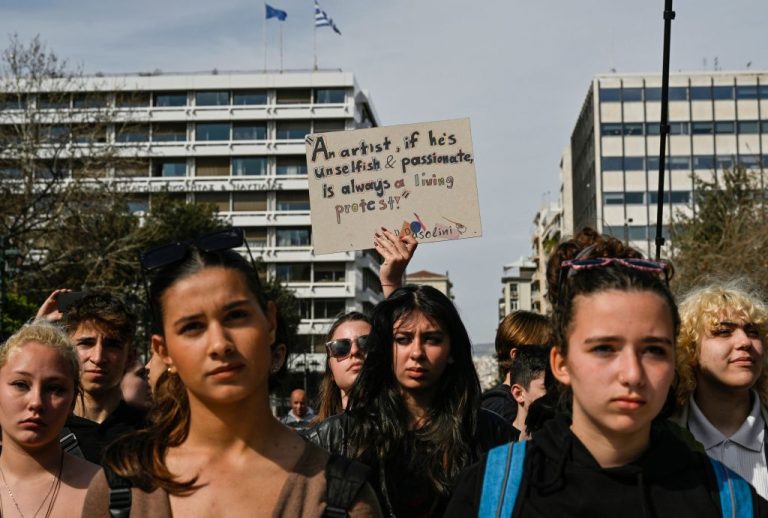After dozens died in Greece’s worst rail disaster on Mar. 1, thousands of citizens crowded central Athens to voice their outrage at those believed responsible.
With the next election period just around the corner, public opinion seems to have shifted following the disaster.
Outrage in Athens
According to police, more than 8,000 people gathered outside Parliament in the capital city of Athens, calling for action against the parties responsible for the tragedy on the railway. The city’s Syntagma Square was filled with people waving banners that read “We won’t forget, we won’t forgive” and “We will become the voice of all the dead”, al-Jazeera reported.
“It was anger and rage that brought me here,” a protester, Markella, 65, told AFP.
Protesters then marched outside the offices of the privatized train operator Hellenic Train, which has been owned by Italy’s Ferrovie dello Stato Italiane since 2017. However, the company isn’t responsible for the maintenance of the railway network, the job of upkeep resides with state-owned Hellenic Railways.
Success
You are now signed up for our newsletter
Success
Check your email to complete sign up
This rally was organized by civil servants, a pro-communist union as well as university students.
Elsewhere, in the city of Thessaloniki, around 5,000 people protested on Sunday. One protester wore a sticker on his sweater, printed in blood-red ink, that read “57 dead,” according to DW.
Earlier this week, initial rallies saw more than 30,000 people protest in Athens, with another 20,000 marching in Thessaloniki. Police responded by throwing tear gas at the protestors, covering the streets in suffocating smoke.
A memorial service was held in honor of 12 students killed in the crash who attended Greece’s largest university, the Aristotle University in Thessaloniki.
READ MORE:
- Tragic Train Collision Strikes Greece, Station Master Arrested and Transport Minister Resigns
- Buttigieg Presses for Tighter Safety Measures After Toxic Ohio Train Crash
- East Palestine Rolled Out Digital ID Wearables Days Before Trainwreck
Greek tragedy on the rails
On Feb. 28, two trains — a passenger train heading for Thessaloniki, and a cargo train enroute to the city of Larissa — collided. Of the 342 passengers and 10 staff on board the passenger train, 57 were killed.
Following the disaster, Greece’s transport minister, Kostas Karamanlis, resigned from his post, saying that it was his “duty” to step down as a gesture of respect for those who died “so unfairly.”
He has since been replaced by George Gerapetritis, who has vowed to fix the “chronically ill train transport system,” the BBC reported.
The 59-year-old station master — supposedly in charge of signaling for the trains — was charged for the deaths “through negligence and causing grievous bodily harm through negligence,” DW reported. The anonymous station master is currently awaiting trial.
Greek media reported that new revelations are being unearthed “almost every day,” with conservative newspaper Kathimerini saying that errors were made during the modernization of the automated signal and operations system in 2018.
These safety loopholes have pressured Prime Minister Kyriakos Mitsotakis’ center-right government, to call for “full cooperation with a judicial inquiry” into the crash. Mitsotakis was recently criticized for pinning the blame on “human error” for the accident. However, railway unions had reportedly sent warning signals to authorities regarding the fragile train network.
According to al-Jazeera, the government recently announced that it would compensate victims’ families “roughly $1,800 per family” for those killed in the crash.







